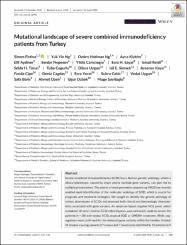| dc.contributor.author | Fırtına, Sinem | |
| dc.contributor.author | Ng, Yuk Yin | |
| dc.contributor.author | Ng, Özden Hatırnaz | |
| dc.contributor.author | Kıykım, Ayça | |
| dc.contributor.author | Aydıner, Elif | |
| dc.contributor.author | Nepesov, Serdar | |
| dc.contributor.author | Camcıoğlu, Yıldız | |
| dc.contributor.author | Sayar, Esra H. | |
| dc.contributor.author | Reisli, İsmail | |
| dc.contributor.author | Torun, Selda H. | |
| dc.contributor.author | Çoğurlu, Tuba | |
| dc.contributor.author | Uygun, Dilara | |
| dc.contributor.author | Eser Şimşek, Işıl | |
| dc.contributor.author | Kaya, Ayşenur | |
| dc.contributor.author | Çipe, Funda | |
| dc.contributor.author | Çağdaş, Deniz | |
| dc.contributor.author | Yücel, Esra | |
| dc.contributor.author | Çekiç, Şükrü | |
| dc.contributor.author | Uygun, Vedat | |
| dc.contributor.author | Barış, Safa | |
| dc.contributor.author | Özen, Ahmet | |
| dc.contributor.author | Özbek, Uğur | |
| dc.contributor.author | Sayitoğlu, Müge | |
| dc.date.accessioned | 2020-12-01T07:35:19Z | |
| dc.date.available | 2020-12-01T07:35:19Z | |
| dc.date.issued | 2020 | en_US |
| dc.identifier.citation | Fırtına, S., Ng, Y. Y., Ng, Ö. H., Kıykım, A., Aydıner, E., Nepesov, S. ... Sayitoğlu, M. (2020). Mutational landscape of severe combined immunodeficiency patients from Turkey. International Journal of Immunogenetics, 47(6), 529-538. https://dx.doi.org/10.1111/iji.12496 | en_US |
| dc.identifier.issn | 1744-3121 | |
| dc.identifier.issn | 1744-313X | |
| dc.identifier.uri | https://dx.doi.org/10.1111/iji.12496 | |
| dc.identifier.uri | https://hdl.handle.net/20.500.12511/6064 | |
| dc.description.abstract | Severe combined immunodeficiency (SCID) has a diverse genetic aetiology, where a clinical phenotype, caused by single and/or multiple gene variants, can give rise to multiple presentations. The advent of next-generation sequencing (NGS) has recently enabled rapid identification of the molecular aetiology of SCID, which is crucial for prognosis and treatment strategies. We sought to identify the genetic aetiology of various phenotypes of SCIDs and assessed both clinical and immunologic characteristics associated with gene variants. An amplicon-based targeted NGS panel, which contained 18 most common SCID-related genes, was contumely made to screen the patients (n = 38) with typical SCID, atypical SCID or OMENN syndrome. Allelic segregations were confirmed for the detected gene variants within the families. In total, 24 disease-causing variants (17 known and 7 novel) were identified in 23 patients in 9 different SCID genes: RAG1 (n = 5), RAG2 (n = 2), ADA (n = 3), DCLRE1C (n = 2), NHEJ1 (n = 2), CD3E (n = 2), IL2RG (n = 3), JAK3 (n = 4) and IL7R (n = 1). The overall success rate of our custom-made NGS panel was 60% (39.3% for NK+ SCID and 100% for NK- SCID). Incidence of autosomal-recessive inherited genes is more frequently found in our cohort than the previously reported populations probably due to the high consanguineous marriages in Turkey. In conclusion, the custom-made sequencing panel was able to identify and confirm the previously known and novel disease-causing variants with high accuracy. | en_US |
| dc.description.sponsorship | Istanbul Bilgi University; Bilimsel Arastirma Projeleri Birimi, Istanbul Universitesi | en_US |
| dc.language.iso | eng | en_US |
| dc.publisher | Wiley | en_US |
| dc.rights | info:eu-repo/semantics/embargoedAccess | en_US |
| dc.subject | Primary Immunodeficiency | en_US |
| dc.subject | SCID | en_US |
| dc.subject | Targeted Next-Generation Sequencing | en_US |
| dc.title | Mutational landscape of severe combined immunodeficiency patients from Turkey | en_US |
| dc.type | article | en_US |
| dc.relation.ispartof | International Journal of Immunogenetics | en_US |
| dc.department | İstanbul Medipol Üniversitesi, Tıp Fakültesi, Dahili Tıp Bilimleri Bölümü, Çocuk Sağlığı ve Hastalıkları Ana Bilim Dalı | en_US |
| dc.identifier.volume | 47 | en_US |
| dc.identifier.issue | 6 | en_US |
| dc.identifier.startpage | 529 | en_US |
| dc.identifier.endpage | 538 | en_US |
| dc.relation.publicationcategory | Makale - Uluslararası Hakemli Dergi - Kurum Öğretim Elemanı | en_US |
| dc.identifier.doi | 10.1111/iji.12496 | en_US |
| dc.identifier.wosquality | Q4 | en_US |
| dc.identifier.scopusquality | Q3 | en_US |


















